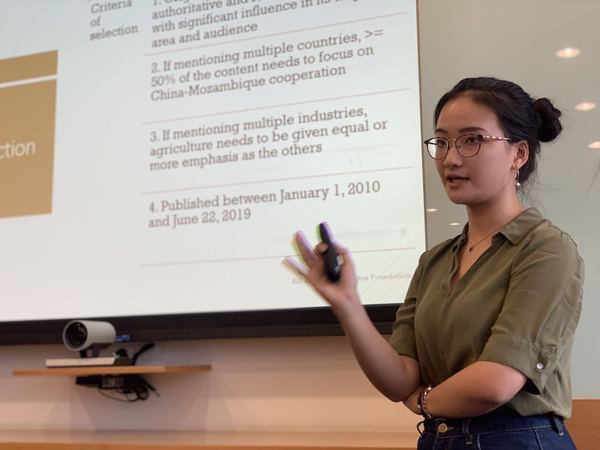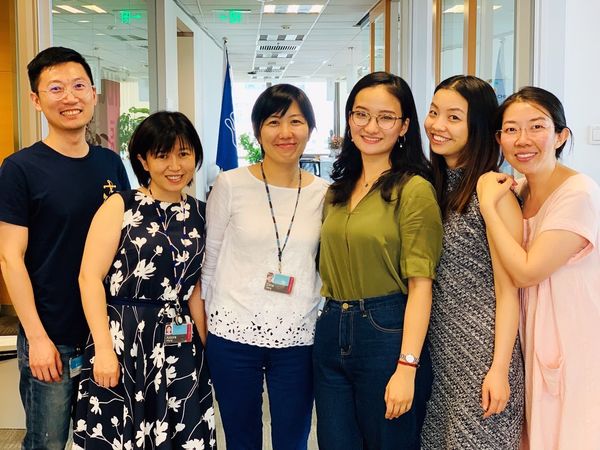Over promise, over deliver: Lessons learned from the Global Professional Experience program
 Zhang spent her summer at the Bill & Melinda Gates Foundation (BMGF) in Beijing
Zhang spent her summer at the Bill & Melinda Gates Foundation (BMGF) in Beijing
Attina Zhang, originally from Nanjing, China, is a rising junior with a double major in sociology and applied and computational mathematics and statistics (ACMS), and a minor in digital marketing. Zhang spent her summer in Beijing, China, as part of the Global Professional Experience (GPE) program working for the Bill & Melinda Gates Foundation in the communications office. She writes about her experiential learning opportunity and why it pushed her to set higher expectations.
Four weeks ago, I started started at Bill & Melinda Gates Foundation (BMGF) in Beijing as a rising junior in the GPE program. Walking into the world’s most famous philanthropic multi-national organization, I felt a complex combination of awe, honor, fear, and uncertainty, while meeting two other interns who are respectively from Yale University and Tsinghua University. This certainly did not help ease my nerve. Besides questioning my competencies in completing professional tasks in communications, I was also worried that my lack of awareness in Chinese business etiquettes and how that will create obstacles along the way. Therefore, at that time, I heard a voice in my head: under promise and over deliver, so they will understand your limited capacity and be content with your results.
My tactic did not go well. The third day after my advisor Jing, the senior communications officer of BMGF, gave me the task to research the media coverage on China-Africa agricultural cooperation in the past decade, we had our first one-on-one touch base. I was roasted in the politest way. Facing this broad and complicated topic, I decided to follow my tactic by telling them I tried to do some searching on Google and Baidu and I could only find a certain number of results. I managed to put up an Excel sheet with over 60 pieces of news reports from media around the world, categorized by regions (Chinese, African, American, and other international media). My shaking confidence was shattered by her one question, “To what extent can I trust your conclusion made from the data you collected?” The answer couldn’t be clearer for both of us. She looked me in the eye and gave me a warning, “I think you can do a lot better.” On the communications team at BMGF, under promise is not allowed.
 Zhang is pictured with the communications team of BMGF Beijing
Zhang is pictured with the communications team of BMGF Beijing
Three weeks after that day of failure and disappointment, I showed Jing my final results with a 30-page slide and an 11-page research paper. For the first time, she looked impressed at my results and showed her appreciation by immediately booking a conference room for me to present my findings the next day. The whole office showed up under her effective marketing, and I gave a one-hour presentation of my coping study of media coverage on Chinese agricultural engagements in Africa. My research is a bold and ambitious attempt to simmer down a complicated topic to a few bullet points, but it is a seminal start for both me and employees at BMGF that are interested in China-Africa relations. Through my research process, I first solidified my goal, which is to provide a first-hand and timely study for the communications team on how and why Chinese, American, African, and other international mainstream media show distinctions when reporting China-Africa agricultural cooperation. The team can then support Chinese reporters better by keeping them informed of other media’s dynamics. I also broke the boundaries of my technical skills in data gathering, term frequency analysis, sentiment analysis, and emotion classification (via R programming language), by actively brainstorming, reviewing the related college course materials, and consulting reliable online resources. My scrupulous research methods and conscientious efforts were well-received, sparking an active discussion on how R can be better utilized to acquire more useful information and how this research can be improved to be more academic, precise, and convincing in the future.
Along the way, my attitudes and perspectives towards personal value, real professionalism, and career competencies were reshaped continuously and significantly by my surroundings. Even though I didn’t have the opportunities to work collectively with others on this project, I was invited to the weekly communication meetings, where I witnessed how the most efficient team of seven worked at full support, passion, and capacity. Outside of my professional experience, I attended lunch and learn events, exchanged ideas with my intern peers, and established connections with many outstanding people through casual chats in the pantry. These invaluable experiences taught me to not refuse giving my best efforts just because the task is divergent from my expectations. In a real working environment, we cannot decide what difficulties we are going to face, but we can choose how we deal with them.
I over delivered what I had over promised. When I finished my last day of the internship and walked out the office, I knew that there is a much greater world for me to explore and I will be a more competent member of it as long as I over promise and to over deliver.
Learn more about the Global Professional Experience (GPE) program.
Originally published by at beijing.nd.edu on July 17, 2019.